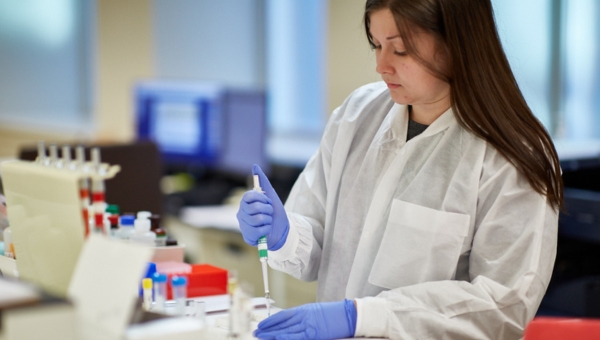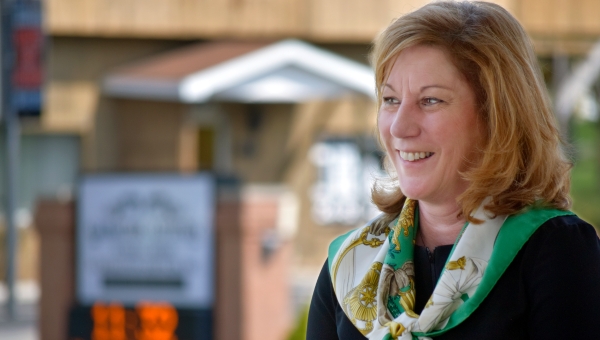Living to Save Lives
By Tina Tuminella
CMU alumna educates and advocates for organ donations
During her career, Carnegie Mellon University alumna Susan Stuart has seen the absolute worst and best days of many people’s lives.
In her early 20s, she worked as a trauma unit nurse, where she became very familiar with death and dying — and was introduced to the work of the Pittsburgh Transplant Foundation, now the Center for Organ Recovery and Education (CORE). Her experiences in the ICU gave her a unique understanding of the importance of offering hope to grieving families.
“I had the great opportunity to see how — during a terrible tragedy — family members are given hope through donation,” she says. “These deaths are often unexpected, and families are searching for meaning and purpose. Donation provides purpose.”
Organ donation also provided Susan with her life’s purpose. She was so moved by CORE’s work that she left her nursing position to become an organ and tissue procurement coordinator for the organization in 1989, rising to the level of assistant executive director before leaving in 1999. After five years at UPMC, she returned to CORE in 2004 as CEO and president, a position she’s held for 20 years.
“Leading CORE is like being a bedside nurse, in that our mission is to save and heal lives,” she says. “They [organ recipients] have entirely new leases on life. They are the most grateful people that you have ever met. They take nothing for granted.”
I chose Heinz due to its outstanding reputation. Highly recommended by colleagues, I was confident that the learning environment would significantly advance my professional career. I had high hopes for professional growth through this experience, and the stellar reputation of Heinz reassured me of that potential.Susan Stuart
It Takes a Vast Village
Susan’s journey with CORE started early, and she credits her mother and two sisters, who were also nurses, with instilling in her a passion for the organization’s mission.
“Witnessing their hard work and dedication to serving others deeply motivated and inspired me,” she says.
CORE is one of 57 nonprofit organ procurement organizations, or OPOs, across the United States. The 250-member team’s makeup is diverse, including administrators, surgeons and procurement coordinators — who often double as critical care nurses — funeral directors, employees who train at technical schools to learn how to scrub, support staff, finance staff, IT workers and regulatory professionals.
Early in her career at CORE, Susan was instrumental in crafting the PA Act 102 law of 1994, known as “Routine Referral,” alongside colleagues at Latrobe Hospital. In the past, identifying a potential organ donor was voluntary, and Routine Referral established a process for hospitals statewide to mandate the referral of a potential organ donor to their local OPO.
In just three years, PA donations increased 43%, compared to 6% nationally, and this early legislation became a model for other states.
Following this success, Susan earned a Master of Public Management from CMU’s Heinz College of Information Systems and Public Policy in 1997. She credits that experience with helping her develop crucial leadership skills and a robust professional network filled with contacts from various leadership backgrounds and with diverse perspectives.
“I chose Heinz due to its outstanding reputation. Highly recommended by colleagues, I was confident that the learning environment would significantly advance my professional career,” she says. “I had high hopes for professional growth through this experience, and the stellar reputation of Heinz reassured me of that potential."
Susan has used her Heinz education and passion for the work to guide what she calls “CORE’s decade-plus-long performance excellence journey,” culminating in the organization winning a Malcolm Baldrige National Quality Award, a national recognition for organizational performance excellence, in 2019.
That same year, Susan participated in a year-long fellowship with the Baldrige Executives Fellow program, which focuses on assisting organizations to more efficiently accomplish their missions and connected her with Baldrige organizations throughout the county to learn directly from their leadership. CORE is one of only three OPOs that have participated in the program.
In June 2023, Susan was recognized with a Lifetime Achievement Award given by the Association of Organ Procurement Organizations, which honors people who have made significant contributions in the field of organ donation.
I've continued to personally and professionally grow through this journey of my position here at CORE, so it's always been fulfilling. The mission to save and heal lives through donation? There is absolutely no mission like it.Susan Stuart
"No Mission Like It"
Authentic leadership has been Susan’s key to success at CORE.
“It’s vital to gain the trust and maintain integrity with your team,” she says. “A high level of integrity and passion for the mission are also essential.”
She has cherished her collaborations with everyone from transplant surgeons and hospital administrators to community members and leaders. She also points with pride to the bereavement program at CORE she helped develop, which assists families navigate their personal journeys of grief. A permanent wall at CORE’s headquarters lists those who have donated their organs and is available for family members to visit.
“I've continued to personally and professionally grow through this journey of my position here at CORE, so it's always been fulfilling,” she says. “The mission to save and heal lives through donation? There is absolutely no mission like it.”

CORE is only one of a few OPOs nationwide to house a full-service laboratory. Here, a CORE laboratory specialist runs serologies as part of the organ allocation process.
We can't keep up with the demand for organs in our current state. There's no way that we can ensure an organ transplant if we continue to do the same thing over and over in the same way, so we have to be open to new technology, to new innovation, and try to increase organs for those recipients who are waiting.Susan Stuart
Longevity in the Field
During her career, Susan has seen it all — from witnessing a transplanted heart start beating for the first time to seeing a donated kidney start to make urine during the transplant surgery.
Her experience, leadership and passion for helping others combined with a relentless pursuit of excellence has made her a pioneer in the field of organ donation and transplant for more than three decades. Thousands of individuals nationwide owe their second chance at life to her work.
But Susan is not done yet. She’s always thinking about what’s next for the organization and for the field, especially in light of new technologies.
“We can't keep up with the demand for organs in our current state. There's no way that we can ensure an organ transplant if we continue to do the same thing over and over in the same way, so we have to be open to new technology, to new innovation, and try to increase organs for those recipients who are waiting,” she says.
“We have grown so much and we will keep examining and improving our critical key processes. We need to continue building very strong processes so that there is never a missed opportunity for a family to give the gift of life.”

CORE President & CEO Susan A. Stuart at a flag raising ceremony celebrating National Donate Life Month.
Working Toward Zero
Susan and her team at CORE are acutely aware that each day in the United States, 19 people die waiting for life-saving organ transplants.
Nationally, 16,336 generous deceased donors saved the lives of 39,679 individuals through organ donation in 2023. In CORE’s service region (which includes western Pennsylvania, most of West Virginia and one county in New York), 404 deceased donors saved the lives of 928 individuals.
The fact that 2,500 people living in CORE’s region are currently awaiting critical organ transplants keeps CORE’s mission urgent. Learn more about CORE and how you can be a part of their life-saving work.